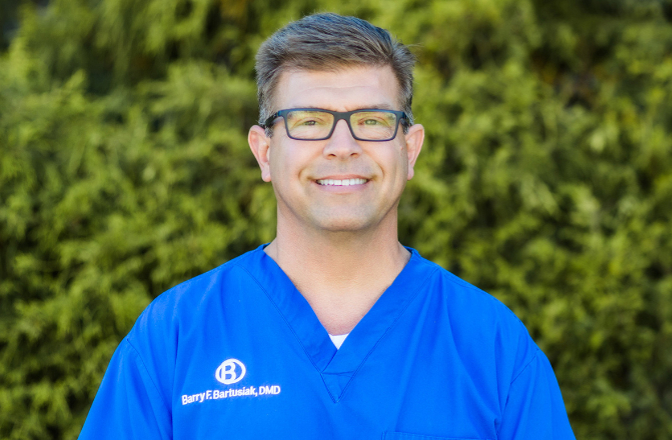It is easy to get deep into your dentistry and just be focusing on your next extraction, implant, root canal, etc. Your ability to concentrate makes you an incredible doctor, but to make sure your practice is humming it is important to stop and think about the bigger picture.
You needn’t invent a philosophy for your dental practice, we have a dental business guru who is hosting the first season of our videocast and podcast series The Margin Line, Dr. Barry Bartusiak. Doc shares the five mindsets he has experienced at successful business practices. Use these as guidelines to run your practice and you’ll forever be making the right decisions for your patients, your business, and your personal life.

Put your patients first
Dr. Bartusiak is a sports fanatic. As a former athlete, coach, and team dentist for the Pittsburgh Steelers, he appreciates the competition, the drive to win, and the strength needed to play well. He also likes the aspect of coaching on and off the field clock. Dr. Bartusiak’s favorite in sports (and life) is the legendary college basketball coach John Wooden.
Wooden was the head basketball coach for the University of California, Los Angeles (UCLA) from 1948 to 1975, where he led them to an astounding 10 NCAA Championships. He was known for his meticulous manner of running his team and program. More than his prowess as a winner, he was known for integrity and humility, which he ingrained into his players. He encapsulated his teachings in well known quotes.
“I believe in the basics: attention to, and perfection of, tiny details that might be commonly overlooked…They are fundamental to your progress in basketball, business, and life.” —John Wooden
Now, you may wonder what Wooden has to do with putting your patients first. Dr. Bartusiak sees himself as a coach in a different way—for new, up-and-coming, and struggling dental professionals. Like Wooden, Dr. Bartusiak believes in the power of the basics. In this case, the fundamentals apply to how you treat your patients. They are the reason your practice exists. So, every business decision should have the patient at its core.
Dr. Bartusiak believes in everything you do, you must ask yourself “How will this benefit my patient?” If your efforts are not to improve the overall patient experience, then he suggests you ask yourself why you are doing it. If you don’t, you may lose patients. And that is fundamental to the success of your practice.

Let your morals be your business practice compass
“Never lie, never cheat, never steal.” —John Wooden
Some may believe that business and dental health care conflict. In other words, you can’t make a profit by being a caring dentist. When the idea was posed to Dr. Bartusiak that business and dental health care conflict he said, “Only if you let it.”
For years, business has had an underlying understanding that if you treat people how you want to be treated, they will return as a customer. The same applies to patients. According to Dr. Bartusiak, patients want to be listened to and validated. “They want to believe that you care about them,” he said. “and that this [relationship] is more than just fixing my teeth, my smile, and my chewing habits.”
If a patient extends trust to you as their dentist, you must build up that relationship and not squander it. Dr. Bartusiak believes that you must go into your practice every day with the awareness that you are creating an experience for the patient. We have already stated that you need to put the patient first. Even more, your internal north star must be a morality beyond reproach. Your patients must believe that no matter what, you will not pressure them into case acceptance or suggest questionable procedures. You must choose what is best for your patient. That is what is best for your business. You do not want to make decisions to cut corners that will impact the patient later.
When asked if he had any examples of suspect moral business decisions, Dr. Bartusiak shared a story of a dentist who asked him for some advice. The individual approached him saying he was looking for a way to deal with costs by taking a shortcut in the root-canal process. The man said to Dr. Bartusiak, “I’m thinking of using paper clips as post ups inside the root canal tooth.”
You need to have a long talk with the man upstairs,” Doc responded. He cautioned the dentist that what he was describing was beyond unethical. Dr. Bartusiak then warned the person to change his ways, or what he was doing would lead to something dangerous for his patients and his practice.
Dr. Bartusiak uses the story as an example to describe how dentists are under continuous pressure, especially financial stress can get into the wrong mindset. When faced with such adversity, people don’t necessarily make the best decisions morally, financially, or business-wise. Ultimately, it is a betrayal of the trust your patient gives you. If they find out, patients will vote with their feet. Even worse, you may lose your dental license and the ability to practice. If you are in a money squeeze, never compromise your morals to cut corners. Trust in doing what is right, and it will pay off for your practice in the end.

Choose the voices that you listen to carefully
“Whatever you do in life, surround yourself with smart people who’ll argue with you.” —John Wooden
Dr. Bartusiak states, “we as a profession need to listen to the right voices.” This advice is not something a dentist hears enough. Some pseudo-advisors pose as experts that weigh in on how to master a dental practice successfully. Yet, how many of those willing to give instruction have the practical experience and the depth of knowledge that qualify them to provide sound counsel?
Dr. Bartusiak explains that many of these people have never touched a tooth, worked a weekend or evening in a dental office, and have no genuine “skin in the game.” They go into a practice and tell them what to do, armed with what may have or have not worked before. One of Dr. Bartusiak’s least favorite pieces of advice is, “You should have your staff read a script.”
He asks, “Did you ever have anybody read a script to you over the phone?” It immediately feels disingenuous, especially if they get your name wrong. That is not treating your patients with respect and dignity.
He shares that these were the same type of people he began his practice listening to, and they were the wrong people. It’s akin to taking parenting directions from someone who has never had a child. While they may be able to give you some insights, those who can talk the talk have already walked the walk.
The same holds true for any profession. One should listen to those who have proof of accomplishments, understand team leadership, know best practices that work and workflows that bring success. They are armed with intelligence, experience, and wisdom. They have your best interest at heart, and aren’t afraid to tell you when you are wrong. They also want everyone to succeed out of empathy and wanting the best for the dental industry.

Create a work-life balance
“Success is peace of mind, which is a direct result of self-satisfaction in knowing you made the effort to become the best of which you are capable.” —John Wooden
Years ago, Dr. Bartusiak decided that his life centered should be around his family. That is all that matters to him. He wanted to send his kids off on the bus early in the morning and be there for them in the afternoon. So, he set his office hours from 7:30am to 2:30pm. But he found himself working Saturday mornings through the summer. Then, Dr. Bartusiak said something significant happened.
“I was working from 8 to 12, and it was just about the third Saturday in a row. It was a beautiful summer in Pittsburgh. Eight patients were scheduled, two families of four, and nobody showed up. I’m like, ‘Well, why don’t you show up?’ Oh, we’re out golfing. We’re out boating. We’re out enjoying ourselves as a family. I’m like, ‘Well, guess what? If you guys can go do that. So can I.’ And that was it. I said, ‘That’s enough. My family is as important as yours, so I’m going to make that decision.’ And we as a profession need to say that too.”
Doc elaborates on the point by explaining that all teams get miserable when overworked and in the office until “dark 30 at night.” Then, they go home to their children, who are in bed. They wake up in the morning and return to work. “What kind of life is that?” he asks.
This experience is an enduring lesson to learn for anyone, dentist or not. You must show concern for yourself first because the caregiver cannot go down. Then, you must be mindful of those around you, whether your family, friends, or community. By doing this order of care, you will find that your empathic ability as a dental caregiver will only increase. It will indeed enrich what you bring to your practice.
Every day, dental healthcare providers face choices that can inevitably break patients’ trust by compromising safety and ruining their future as dental professionals. To be a true success, putting your patient first is not an option. They must be at the center of your practice and every decision made. To ensure this choice stays intact, you need to listen to the right voices, whether the internal prompt to do what is right or choosing not to listen to those advising you poorly.
Lastly, something key to remember is that your success starts with the balance you create between work and life. People who are stressed and lack proper rest are more likely to make ethical accommodations and succumb to financial pressure. Play it safe. Lean into good advisors, like Dr. Bartusiak, and listen to your moral compass. Dentistry can be your passion but it does not need to be your entire life. Time away from the office refreshes you, gives you peace of mind, a rested body, and improves your profession.
Now, you can bring that to the patient experience.

Only partner with the best, including labs, and use solid technology that shows a return on investment
“If you don’t have time to do it right, when will you have time to do it over?” —John Wooden
Dr. Bartusiak believes there is a large void in the dental profession that needs to be filled. He predicts that Dandy will help solve this issue in several ways.
First is the education that he will participate in via The Margin Line videocast. Dr. Bartusiak sees this as an opportunity to create a business institute for dentists. It is well known that dentists graduate with a wealth of dental knowledge but lack the business acumen to be good practice owners. With the help of Dr. Bartusiak and other dental experts in the field, Dandy will create something that dental professionals can access anytime and anywhere.
Second, technology is the future of dentistry. Dandy offers a better way to acquire software and tools without incurring significant debt. Dandy’s intraoral scanner is a perfect example of how they are helping dentists. Essentially providing a $30,000 tool without cost under the agreement that dental offices use Dandy Labs for a minimum amount per month. According to Dr. Bartusiak, “You’re going to do a $1,000 amount of lab work anyway. Now, you get a free scanner.” To him, it made sense. By modernizing workflows with digital dentistry, you will see the profit margin organically rise because you can serve more patients in less time. And time is always a proxy for money.
Third is partnering with the best labs possible. Dr. Bartusiak expressed his surprise when visiting the Dandy labs. They were clean, spotless, and well-organized. He said that people would be astounded if they knew the conditions of labs where crowns and prosthetics were fabricated. He likened it to “a local neighborhood mechanic shop.” This type of shop “had parts all over the floor” of the garage, “with grease everywhere,” including on the mechanic, who was covered head to toe. “It just looked like chaos.” Dr. Bartusiak says, “That’s what a dental laboratory usually looks like if you’ve never seen one.”
As for Dandy, the doctor told us that it was a far better experience. The Dandy dental labs were immaculate, and their technicians were highly trained. Pairing the technology with impeccable fabrication made for a better crown. Dr. Bartusiak pointed to the evidence of his first 98 crowns made by Dandy—none needed modification.
Every dentist understands the difficulty of adjusting a zirconia crown. Without the need for corrections to crowns, the dentist saves time, and the patient benefits from an enriched experience. Then, there is Dandy’s support team. Dr. Bartusiak could only say positive things about them.
“I cannot sing their praises loud enough, long enough, or often enough. Because when you call them, you email them, the response is instantaneous. I mean, it’s instant. You don’t have to wait for days.”
Dr. Bartusiak admitted that in the past, with other laboratories, sometimes he would not hear from them for a day or two when he called. That was never the case with Dandy.



